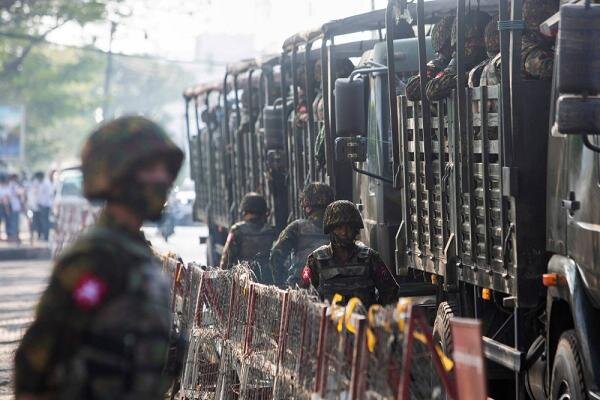Violence in Myanmar and its impact on neighboring countries

reported by Mehr News Agency quoted by Anatolia News Agency, on the seventh anniversary of the forced departure of hundreds of thousands of Rohingya Muslims from their homes due to the attacks of the Myanmar army, the conflicts in this country continue to affect neighboring countries; It affects Thailand, Bangladesh and India, as well as Malaysia and Indonesia, where Arakan Muslims have taken refuge.
Myanmar army and Buddhist racists, citing simultaneous attacks on border posts in Arakan state, started widespread violent actions against Rohingya Muslims on August 25, 2017.
Attacks carried out by the armed groups of the Myanmar National Democratic Union Army, the Arakan Buddhist Army and the Taang National Liberation Army under the name of “Three Brothers Alliance” against the Myanmar army, have affected the lives of civilians in The area has a negative effect.
According to the data of the United Nations High Commissioner for Refugees, more than 1.3 million people of Myanmar have sought refuge in neighboring countries due to the conflicts in this country, of which more than 1.1 million Some of them are Rohingya Muslims. The number of internally displaced people in the country has been announced to be approximately 2.6 million people.
About 981 thousand 65 Rohingya Muslims have taken refuge in Bangladesh, 107 thousand 700 people in Malaysia, 22 thousand 600 people in India and almost 2 thousand Rohingya Muslims have also taken refuge in Indonesia.
During the clash between the army and anti-military armed groups of the Myanmar government on February 6, a mortar shell fired from across the border hit the Bangladesh border, killing 2 people. Then Bangladesh summoned Myanmar’s ambassador in Dhaka.
After the resignation of Sheikh Hasina, the former Prime Minister of Bangladesh and her departure from this country on August 5, the situation of Rohingya Muslims was also noticed.
India, which shares a 1,600 km border with Myanmar, is also worried about violence and instability in this country. The states of Arunachal Pradesh, Nagaland, Manipur and Mizoram, bordering Myanmar, have been affected by the conflicts in this country.
Thailand’s special anti-narcotics task force announced on July 8 that some armed ethnic groups fighting with the Myanmar military have been trading drugs within or They do it through Thailand.
While the United Nations noted that Myanmar military airstrikes against civilian targets are increasing. United Nations High Commissioner for Human Rights Volker Turk said that since the beginning of the military coup in Myanmar from February 2021 to June 18, 2024, about 5,280 civilians have been killed by the Myanmar army.
In this regard and in order to stabilize the situation in this country, it was proposed to immediately stop violence, deliver humanitarian aid and start dialogue between the parties.
General Helling also promised to start talks with Suu Kyi in April 2020, but he did not do so. Subsequently, ASEAN also banned Myanmar’s military leader from attending its meetings.
A3 consists of 10 countries, Indonesia, Malaysia, Thailand, Philippines, Singapore, Brunei, Vietnam, Laos, Cambodia and Myanmar.
On February 1, 2021, the Myanmar army released a statement announcing the arrest of the ruling National Union for Democracy party spokesperson and Aung San Suu Kyi, on February 1, 2021. He said that the power has been transferred to Min Aung Hlaing, the commander-in-chief of the army.
The Rohingya Muslims, who lost their citizenship rights and became a stateless Muslim minority in Myanmar with the approval of a law by the Myanmar government in 1982, were finally killed by the Myanmar army on August 25 In 2017, they were severely attacked.
Myanmar army and extremist Buddhists started ethnic cleansing attacks against Rohingya Muslims under the false pretext of attacking the country’s border posts in Rakhine state. In these attacks, more than 900,000 Rakhine (Arkani) Muslims took refuge in Bangladesh and hundreds of Muslim villages were set on fire. International human rights organizations confirmed by publishing satellite images that hundreds of Muslim villages have been destroyed.
The United Nations and other international human rights organizations describe the violence against Rakhine (Arkani) Muslims in Myanmar as “ethnic cleansing” and “genocide”.
According to the data of the United Nations High Commissioner for Refugees, the number of Rakhine (Arkani) Muslims who fled persecution in Myanmar after August 2017 and sought refuge in Bangladesh is more than 10 thousand people have reached.
According to the United Nations, 52% of the population of the 34 refugee camps in Bangladesh are children and 48% are Rohingya adults and elderly people.
Also, according to the United Nations, 92,000 Rohingya Muslims have fled to Thailand and 21,000 of them have fled. Some Rakhine refugees have also sought refuge in Indonesia, Nepal and Malaysia.
Michel Bachelet, the former high commissioner for human rights of the United Nations, said in this connection that the conditions for the return of Rohingya refugees to their homes in Myanmar have not been met.
As always, the authorities of Western countries have a selective approach to the issue of human rights. For example, until the overthrow of the civilian government of Myanmar, they closed their eyes to the organized genocide of the Rohingya Muslim minority, and we never saw their decisive stance against this inhuman act. If we are currently witnessing such a reaction from the West, it is because of their concern about securing their interests in a part of the Indo-Pacific strategic region.


